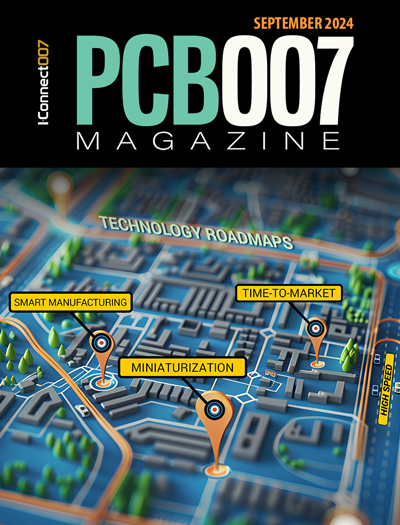-

- News
- Books
Featured Books
- pcb007 Magazine
Latest Issues
Current Issue
Engineering Economics
The real cost to manufacture a PCB encompasses everything that goes into making the product: the materials and other value-added supplies, machine and personnel costs, and most importantly, your quality. A hard look at real costs seems wholly appropriate.

Alternate Metallization Processes
Traditional electroless copper and electroless copper immersion gold have been primary PCB plating methods for decades. But alternative plating metals and processes have been introduced over the past few years as miniaturization and advanced packaging continue to develop.

Technology Roadmaps
In this issue of PCB007 Magazine, we discuss technology roadmaps and what they mean for our businesses, providing context to the all-important question: What is my company’s technology roadmap?
- Articles
- Columns
Search Console
- Links
- Media kit
||| MENU - pcb007 Magazine
Intel, Mila Join Forces for Responsible AI
September 15, 2022 | IntelEstimated reading time: 4 minutes
Intel has announced a three-year strategic research and co-innovation collaboration with Mila, an artificial intelligence research institute based in Montreal. As part of this renewed commitment, more than 20 researchers across Intel and Mila will focus on developing advanced AI techniques to tackle global challenges such as climate change, new materials discovery and digital biology.
“In the face of current global challenges, we must push for a culture of open science between academia and industry to successfully advance AI applications for the benefit of society. We are thrilled to collaborate with Intel to rapidly explore novel and needed materials to improve carbon capture, accelerate drug discovery and enable a more sustainable future,” said Yoshua Bengio, founder and scientific director, Mila
Why It Matters: Accelerating the research and development of advanced AI to solve some of the world’s most critical and challenging issues requires a responsible approach to AI and the ability to scale computing technology. As leaders in computing and AI, and with alignment on being a positive, powerful agent of change in our world, Intel and Mila will be able to double down on projects started in 2021, add a third track and significantly increase the support to drive tangible results.
“Solving complex problems like climate change and new materials discovery requires deep AI research coupled with domain expertise and a commitment to advancing state-of-the-art computing technologies," said Kavitha Prasad, vice president and general manager of Datacenter, AI and Cloud Execution and Strategy at Intel. "Today’s announcement will play a critical role in surfacing key insights for researchers and driving forward the technological innovations. We look forward to teaming up with Mila to tackle the challenges we face today and create a better world for future generations with technology.”
About the Collaboration: This extended collaboration will focus on:
Automating AI-driven discovery of novel materials: Advances in chemical simulation techniques, like density-functional theory, have created methods capable of simulating important properties of complex material systems. These techniques, however, have been limited in the complexity of materials systems they can model given the unfavorable scaling of computational cost as the number of atoms increases. AI techniques, especially graph neural networks (GNNs), help approximate chemical simulations with significantly lower computational cost, particularly as the system size increases. This holds tremendous promise in using AI-enabled simulated techniques to replicate materials systems of greater complexity. The potential discovery of novel materials could contribute to cost and carbon footprint reductions.
Intel and Mila will collaborate on developing scientific and technological innovations to improve the performance of GNNs on atomistic simulations, like the Open Catalyst dataset. These efforts can potentially democratize researchers’ ability to engage with atomistic material data by enhancing the related technology pipeline. The research teams will work on creating learning-based frameworks to search effectively within the vast search spaces found in materials design applications. These frameworks can draw upon ideas from reinforcement learning, search algorithms, generative models, as well as other machine learning algorithms including generative flow networks pioneered by Mila.
Applying causal machine learning for climate science: While standard physics-based climate models can help predict the effects of climate change, they are complex and computationally expensive. They often take months to run – even on specialized supercomputing hardware – which reduces the frequency of simulation runs and the ability to provide granular, localized predictions. Furthermore, these models are typically unable to explain the reasoning or causal relationships underlying their predictions. Intel and Mila aim to fill this gap by building a new type of climate model emulator based on causal machine learning to identify which variables are predictive among high-dimensional inputs to traditional climate models. The project seeks to enable significant advancements in climate science and directly inform policy by enabling thorough and trustworthy predictions of the effects of climate change.
Accelerating the study of molecular drivers of diseases and drug discovery: Drug discovery is a lengthy process that on average costs $2.6 billion per approved drug. The cost is high because finding a small molecule that binds to a particular target is a perilous and highly uncertain process that can take more than a decade. Additionally, even when a molecule is found, there’s a possibility that it may fail in later stages.
Intel and Mila researchers will work together to identify better drug candidate molecules more quickly and more simply. For example, predicting complex phenotypes, including diseases based on the genotype of single-nucleotide polymorphisms (SNPs), has been a long-standing challenge in digital biology because most phenotypes are affected by many SNPs across the genome. The main computational challenge is jointly learning the causal effects of all the SNPs in the genome on the phenotypes, using large-scale population data. The exact solution has a search space of size exponential to the number of SNPs. With millions of SNPs detected, the exact solution is computationally intractable. However, with the availability of high-resolution data, the advent of breakthroughs in AI, and growth in compute density driven by Moore’s Law, Intel and Mila plan to develop AI techniques to:
Understand the molecular drivers behind diseases, predicting complex phenotypes including diseases based on the genotype of SNPs.
Identify the most promising drug molecules. The new AI techniques implemented by Intel and Mila aspire to significantly reduce this cost and bring transformative drugs to market sooner.
Suggested Items
CHIPS for America Announces Up to $300M in Funding to Boost U.S. Semiconductor Packaging
11/21/2024 | U.S. Chamber of CommerceThe Biden-Harris Administration announced that the U.S. Department of Commerce (DOC) is entering negotiations to invest up to $300 million in advanced packaging research projects in Georgia, California, and Arizona to accelerate the development of cutting-edge technologies essential to the semiconductor industry.
Global Citizenship: What I’ve Learned About the American PCB Business
11/20/2024 | Tom Yang -- Column: Global CitizenshipNavigating the complexities of the American PCB business has been an eye-opening experience. During my time in America, I have become more familiar with the American PCB business and doing business here. If I may, and with your indulgence, I would like to share my humble impressions of the American PCB industry and the American way of doing business, which I find interesting and admirable.
Spirit Announces Purchase Agreement with Tex Tech Industries for Intended Sale of FMI
11/19/2024 | Spirit AeroSystems, Inc.Spirit AeroSystems Holdings, Inc. announces a purchase agreement to sell Fiber Materials, Inc (FMI) business based in Biddeford, Maine, and Woonsocket, Rhode Island, to Tex-Tech Industries, Inc. for $165,000,000 in cash, subject to customary adjustment.
Ventec to Become Primary PCB Materials Supplier for Teltonika
11/13/2024 | VentecVentec International Group and high-tech design and manufacturing company Teltonika announce that Ventec is to become supply chain partner and primary supplier of PCB base materials to Teltonika, which is preparing to open a new PCB manufacturing plant at its base in Vilnius, Lithuania.
AIM to Present on Micro/MiniLED Applications at Hangjia Talk in Shenzhen, China
11/11/2024 | AIM SolderAIM Solder, a leading global manufacturer of solder assembly materials for the electronics industry, is pleased to announce its participation in the upcoming Hangjia annual industry event focused on the future of the LED display sector.


